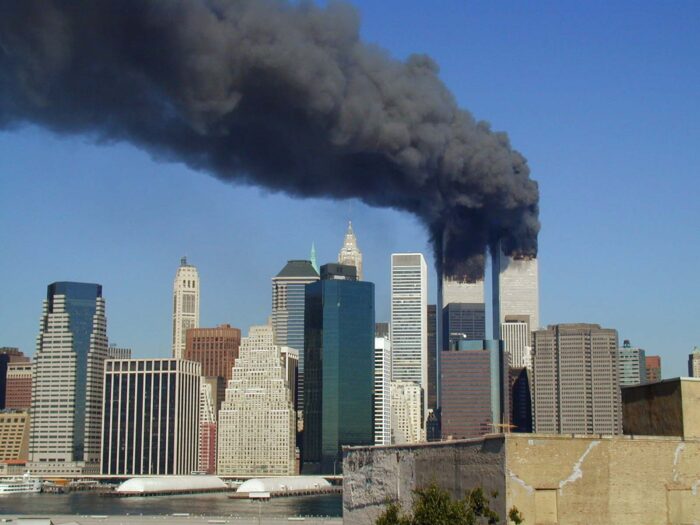Photo: Michael Foran
สัปดาห์ที่ผ่านมา เป็นวาระครบรอบ 20 ปีของเหตุการณ์ 9/11 ซึ่งในปีนี้มีเหตุการณ์เกี่ยวเนื่องกับ War on Terror คือ ตาลีบันกลับมายึดอัฟกานิสถานอีกครั้ง และ ประธานาธิบดีโจ ไบเดน ตัดสินใจถอนทหารออกมา
สถานการณ์ในอัฟกานิสถานอีก 20 ปีให้หลัง จึงเปรียบเสมือนตัวชี้วัดว่า สงครามกับการก่อการร้ายหรือ War on Terror ที่อเมริกาติดหล่มมานานเกือบ 20 ปีเป็นสิ่งล้มเหลว ทั้งจากกลุ่มต่อต้านสงคราม (ที่คัดค้านตั้งแต่ต้น) และกลุ่มสนับสนุนสงคราม (ที่สนับสนุนให้เข้าไปทำสงคราม “ให้สำเร็จ”)
ความเห็นและเสียงวิจารณ์ต่อ 9/11 ในปี 2021 จึงออกไปในโทนเรื่องความล้มเหลวในอัฟกานิสถานซะเยอะ ซึ่งอ่านแล้วก็ไม่ค่อยได้อะไรมากนัก (เข้าใจในความกราดเกรี้ยวหรือความไม่พอใจนั้น แต่อยากได้มุมมองที่ลึกกว่านั้น)
จนกระทั่งมาเจอบทสัมภาษณ์ของ Niall Ferguson นักประวัติศาสตร์รุ่นใหม่ชื่อดังที่เขียนหนังสือหลายเล่ม ให้สัมภาษณ์เรื่องนโยบายการต่างประเทศของสหรัฐอเมริกาทั้งเรื่อง 9/11 และเรื่องจีน (ตัวเขาเป็นสกอตแลนด์ แต่ตอนนี้ได้สัญชาติอเมริกัน) ซึ่งถือเป็นมุมมองที่ “ว้าว” มากเท่าที่อ่านเรื่องนี้มา คมกริบ
Ferguson บอกว่าเหตุผลที่อเมริกาล้มเหลว มาจากปัจจัยภายในประเทศของอเมริกาเองล้วนๆ 3 ประการคือ 1) ขาดคน เพราะกลัวซ้ำรอยสงครามเวียดนาม 2) ขาดเงิน จากปัจจัยงบประมาณขาดดุล และ 3) ขาดความสนใจ ที่เสียงสนับสนุนย่อมจางหายไปตามกาลเวลา
The reason that it’s not going to work is primarily domestic, in fact almost entirely domestic.
There were three deficits that prevented the U.S. being a successful overseas empire. No. 1, the manpower deficit. Americans do not want to spend their lives in places like Iraq and Afghanistan. Even the military do short tours of duty, of maybe six months.
Secondly, a fiscal deficit that was already a problem 20 years ago but has only become a bigger problem. And thirdly and most importantly, an attention deficit. The American public was very indignant after 9/11, but that indignation faded, as was predictable, after about four years.
Ferguson ยังเปรียบเทียบเคสของอัฟกานิสถานกับเวียดนาม ว่าเป็น “ลายเซ็น” ของอเมริกาที่จะถอนตัวจากประเทศเหล่านี้แบบมั่วซั่ว ยิ่งถ้าเทียบกับการถอนตัวของจักรวรรดิอังกฤษจากประเทศอาณานิคม ที่เป็นระเบียบกว่ามาก
you can leave a foreign country behind in an orderly way. Ask the British Empire, which mostly ended its colonial occupations in an orderly way. There has to be some reason why Saigon 1975 and Kabul 2021 were such a mess. And this seems to be an intrinsically American problem: an inability to exit cleanly.
The Americans are bad at this, it’s clear.
ส่วนเหตุผลนั้น Ferguson บอกว่าไม่ได้เป็นปัญหาที่ตัวประธานาธิบดีสักเท่าไร แต่เป็นเรื่องของคนทำงานที่อยู่ข้างใต้นั้น (chain of command) ที่สั่งสมกันมา ปัญหาไม่ได้เกิดจากคนใดคนหนึ่ง
Disasters get blamed on presidents and prime ministers, but often the point of failure is further down the chain of command, because presidents aren’t, by and large, micromanagers.
เขายังอ้างคำพูดของ Henry Kissinger ที่บอกว่าไม่มีหรอก สิ่งที่เรียกว่า “นโยบายต่างประเทศของสหรัฐ” เพราะสิ่งที่เกิดขึ้นจริงๆ คือ การต่อสู้กันของหน่วยงานรัฐต่างๆ ที่มีแนวทางขัดแย้งกัน ผลของสิ่งนั้นแหละที่กลายมาเป็นนโยบายต่างประเทศของสหรัฐ
I remember [national security official and later Secretary of State] Henry Kissinger, in the 1960s, saying: “Foreigners think that there’s an American foreign policy. But, in fact, there’s just the net result of all the interagency battles, and the result is a kind of byproduct of interagency rivalries.”
I think that’s true of the Afghan story. At each stage, there has been a battle between the White House, the State Department, the Pentagon, the CIA and the military. The battle has gone back and forth for 20 years, somewhat inconclusively, but the outcome was always going to be something like this.
เขายังบอกว่า ภัยอันตรายจากตะวันออกกลาง ดึงความสนใจของสหรัฐไปที่ภูมิภาคนี้ จนละเลยภัยคุกคามใหม่คือ จีน ซึ่งถือเป็นจุดเริ่มต้นของ Cold War II ในระยะถัดมา และเปิดโอกาสอย่างมากให้จีนในช่วงทศวรรษ 2000s
So, there was this enormous distraction that the Islamists created that absorbed our attention, our resources, and it turns out that it was really — it was a detour. The big issue was the rise of China.
ปัญหาเรื่องจีนของโลกตะวันตกคือ โลกตะวันตกไม่กล้ายอมรับว่าจีนคือคู่แข่ง จีนคือภัยคุกคาม คนที่พลิกประวัติศาสตร์นี้คือ Donald Trump ซึ่งเป็นคนแรกที่เก็ต และออกมาพูดแบบชัดๆ คนแรก ซึ่ง Trump พูดเพราะต้องหาเสียง แต่พอ Trump เปิดประเด็นนี้แล้ว กำแพงในใจคนอเมริกันก็พังทลาย
The first American to notice, was [former President Donald] Trump. Trump was the first American politician to say, “China is the problem.” As soon as he said that, it was like permission for Americans to be hostile to China.
But then, all the policy elite, both Democrats and Republicans, found that they agreed with Trump, and Trump, extraordinarily, created a huge shift in U.S. attitudes to China, and that was the point at which Americans began to come out of denial and to recognize that they were in “Cold War II.”

